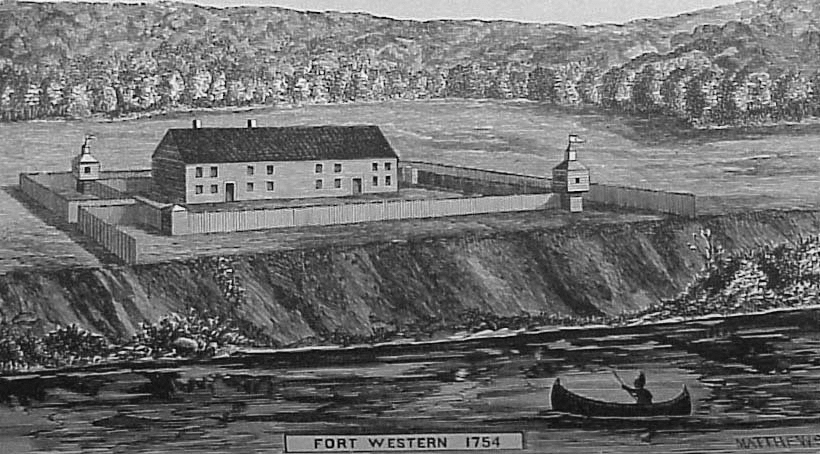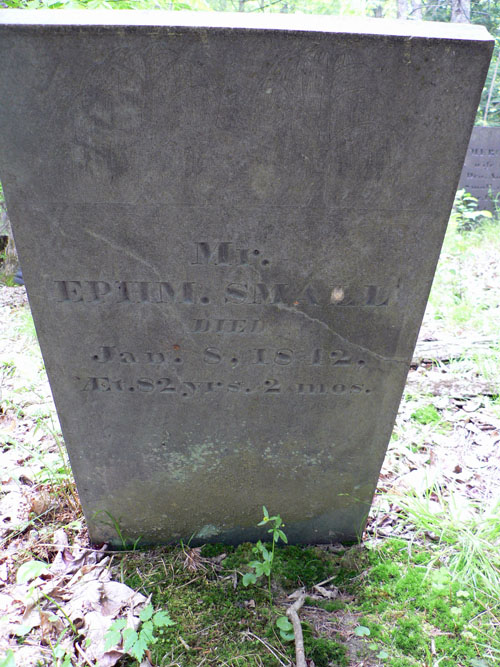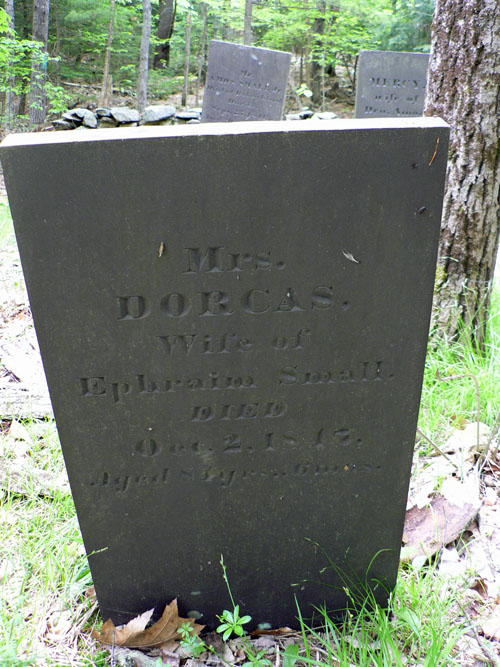|
In 1775 when Ephraim Small, the sixth of Taylor and Thankful’s seven sons was 16, he caught what Taylor Sr. called “liberty fever”. In fact his brothers Taylor and Joseph had it as well. Taylor Sr. had royalist leanings but was more driven by practicality then ideology so he did not object when his sons joined the Massachusetts Troop to fight the British.
By August 1775 the Small boys were serving under the command of Colonel Benedict Arnold at Cambridge, MA. They arrived in time to get on a ship and sail up the Kennebec River passing within sight of Great Island. They arrived at Fort Western, on the Kennebec river with about a thousand other soldiers, from where they were to travel up the Kennebec, across the Canadian divide and down the Chaudiere River to the St. Lawrence to attack Quebec City. General Montgomery was to come up Lake Champlain and invade Quebec from the west.
When Joseph heard the details of this plan he tried to get to Arnold to explain that the upper Kennebec valley was a horror of swamps and steep ridges. He had spent all one summer exploring the region. Arnold would not see him so the plan moved ahead.
Arnold’s plan was to travel up the Kennebec by boats called bateaux. These were a low sided flat bottomed affair that could only be propelled by pushing poles against the river bottom. A fellow named Rueben Colburn from Gardiner was contracted to build the bateaux, which he did in 15 days. Of course due to the short notice there was no seasoned lumber so they were built of green pine.
As seafaring people, the Smalls and other Maine coast men in the army stood in great fear of the flimsy bateaux. When Arnold realized that his army was too large for the bateaux available he split it approximately in half, sending 600 men to march upstream by land. Even though the troops were divided along organizational lines, there was enough swapping on an individual basis that the bateaux contingent contained almost no one with maritime experience. The army left Fort Western on September 25.

Fort Western 1754
The Small brothers met to consider the options. As treacherous as the bateaux appeared, Joseph was convinced that the march would be more dangerous. They concluded that their best chance lay in volunteering to accompany the scouting party under Lieutenant Archibald Steele. The scouts were to travel by birch-bark canoe and blaze the trail from the Kennebec to the Dead River through the Chain-of-Ponds, then up the Dead River marking carrying places and then marking the best trail over the high ground on the border between Maine and Quebec and to Lac Megantic and the Chaudiere River.
It was tough going for ten men, lightly loaded, and would prove to be hellish for Arnold’s army. The Small brothers volunteered to remain in the high ground above Lac Megantic to hunt and scavenge for food to replenish in part the army’s meager supplies. Since the trip back to the head of the Kennebec would be downhill and downstream, Lieutenant Steele agreed and left the Smalls behind on October 7th.
The thinking that the army would need supplies was correct but it was a reluctance to give up the ground gained that may have been the major factor in the Smalls volunteering. As for the hunting they shot a moose, not much further from starvation then the army that was supposed to feed on it. On October 9th Taylor and Ephraim headed down to Lac Megantic carrying the canoe that was left with the Small brothers to see if there was any settlement there that could provide provisions for a thousand men. Joseph remained on the height of land waiting for the army.
It took Taylor and Ephraim a day of lugging the canoe through the brush and swamps to find a significant river that seemed to average a direction that should lead to Lac Megantic. They had blazed the trail to assist them in getting back to the height of land.
It took another day and a half to reach and cross Lac Megantic. There was a small French settlement at the north end of the lake. The settlers were in no way able to supply the necessary food but they sympathized with the rebel cause as long as it discomforted the British. They agreed to send word down the Chaudiere River for the down-river settlements to provide what they could and stage the supplies as far upriver as practical.
Taylor and Ephraim were concerned that they would not be able to rejoin Joseph before the army arrived so they hurried back up the lake and followed the Megantic river up stream as far as they could then followed their blazed trail back to the height of land arriving on October 16th.
They explained the situation to Joseph and settled in to wait for the Army. They did not know that a good portion of the army was stumbling around in the maze of streams and bogs surrounding Spider Lake way off to the east of Lac Megantic.
Arnold and part of the army reached the height of land on October 25. He sent a messenger to provide directions to the lost battalions how to extract themselves from the mess they were in. Unfortunately Arnold’s directions included information from British agents that showed the distance from Fort Western to Quebec was one-hundred and eighty miles. If fact it was three-hundred and fifty miles.
With all the confusion it was the 9th of November before the army of 600 men out of the 1100 that started, arrived at the St. Lawrence, without a single one of the bateaux. Arnold bought and borrowed canoes to shuttle his army across the mile wide St. Lawrence. He advanced on Quebec about October 15th without any cannon or field pieces and men barely able to march, let alone fight. He withdrew on the 19th to wait for Montgomery with his 300 men.
With Montgomery’s 300 men and supplies and many enlistments being up on January 1, they attacked Quebec City on December 30 and 31. They were unable to take the city, losing 100 men killed and 400 captured of the combined force of about 900. The Smalls survived and after taking part in the leaky siege of the city until the spring of 1776, joined in the retreat to the head of Lake Champlain.
There they participated in the next of Arnold’s failures. They were part of the lake navy that lost the battle of Valcour Island in October of 1776. This loss did serve its purpose in delaying what was supposed to be the decisive thrust by the British from Canada, until 1777. By then the colonists were ready. In October 1777 at Bemis Heights Arnold’s counterattack so demoralized Burgoyne that he surrendered days later. The Small boys were finally on the winning side.
In 1778 the brothers were mustered out and received a pittance in cash for their three years of service. What they did get of value was land. A cash-starved and land-rich country granted farm land to its soldiers. Each of the Small brothers received prime farm land in and around Bowdoin, ME.
Taylor Jr. took possession immediately and set up his homestead. One by one the Small children as they married migrated inland to take up farming in the town of Bowdoin. The exception was Samuel who moved east to the banks of the Kennebec River where he began building boats for local fishermen. Taylor Sr. and Thankful retired to local fishing and light farming at the Sebascodegan property.
In the summer of 1779 Ephraim was helping out his brother Thomas, fishing in Casco Bay. At that time there was a bait dealer named John Coombs operating from a wharf out on Newaggin (later Bailey) Island, which was handy to the fishing grounds. When Thomas and Ephraim tied up to buy bait they were waited on by a girl just out of her teens. She was dressed in rough fisherman’s clothes and easily handled hundred-pound tubs of bait but that wasn’t fooling Ephraim. He recognized her as Dorcas Coombs, the angel he admired from afar in church every Sunday back on Great Island.
They struck up a conversation and, to make a short courtship an even shorter story, were married in the spring of 1780. Ephraim and Dorcas settled in Bowdoin where Ephraim owned about 100 acres. There they raised crops, cattle and children. By 1806 they had 13 children:
Deborah Small 2/19/1781, Bowdoin, ME died before 1788
William Small 3/2/1783, Bowdoin, ME
Ephraim Small 12/6/1785, Bowdoin, ME
Rosannah Small 10/26/1787, Bowdoin, ME
Deborah Small 11/24/1789, Bowdoin, ME
Mark Small 4/28/1790, Bowdoin, ME
Francis Small 2/14/1792, Bowdoin, ME
Amos Small 9/1/1794, Bowdoin, ME
Mark Small 2/1/1796, Bowdoin, ME
Elisha Small 4/25/1798, Bowdoin, ME
Richard Small 4/24/1800, Bowdoin, ME
George Small 1/11/1802, Bowdoin, ME
Levi Small 8/1/1805, Bowdoin, ME
Ephraim and Dorcas were farmers during some of the prime years for farming in Maine roughly 1780 - 1880. They lived comfortably and peacefully until the war of 1812 when Ephraim again served, this time alongside his son Ephraim Jr. Ephraim Sr. returned to the farm where he died in 1842 at age 82 years 2 months. Dorcas died in 1847 at age 84 years 6 months. They were buried in a private cemetery in Bowdoin.


Gravestones of Ephraim and Dorcas Small
|




